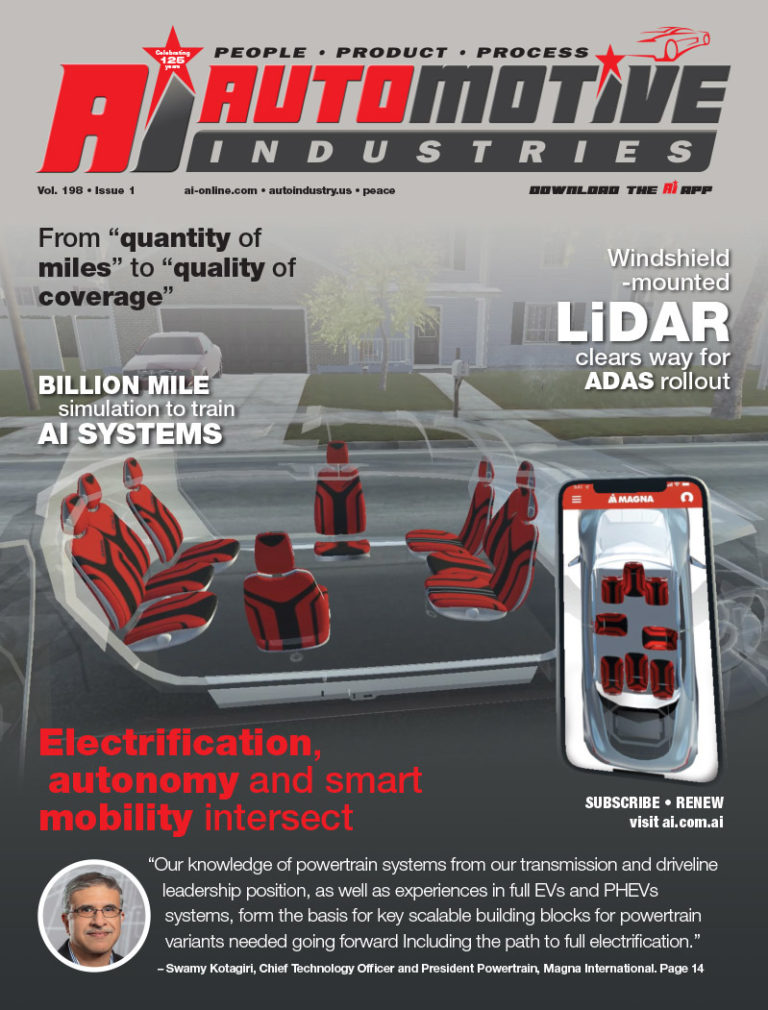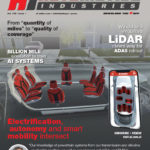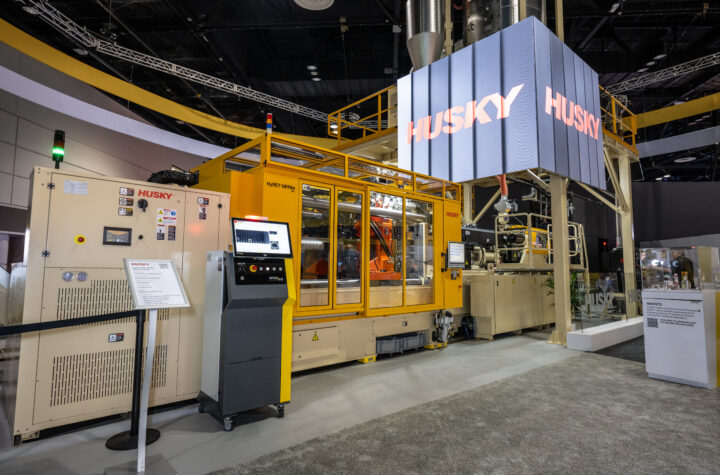The 2006 Automotive Industry Executive of the Year is Ford Chairman and CEO Bill Ford.
Speaking at the award ceremony, Ford emphasized the importance of not only employing a clear strategy but adjusting to an ever-changing atmosphere.
“Every morning when you pick up the paper, there’s a new headline with a new set of ramifications. We’ve never had this kind of wind buffeting us daily,” Ford said. “We better be nimble, and we better be quick.”
The award, which recognizes excellence in automotive leadership from OEM executives, was presented by the Automotive Industry Action Group (AIAG) and DNV. Ford stressed that in order for the company to regain North American profitability, it needs to take an honest approach.
“It doesn’t matter how good a plan you put together, if it’s not based on cold reality and not based on facts, it’s not going to succeed,” said Ford. “The first thing we have to do is get honesty on the table — honesty about our competitive position, the strengths of our products and the robustness of our processes.”
Ford’s candidness is one of the qualities that make him a true leader in the automotive industry, according to Carla Kalogeridis, editor-in-chief of AIAG’s Actionline magazine,
“He’s the face of the automotive industry right now,” Kalogeridis said. “There’s nobody else that’s stepping up to the forefront and laying it on the line like he is. There are a lot of positive and not-so-positive announcements going on these days, and I think he’s the one who’s willing to stand out there, put his face on the industry and put his face on his company. It takes courage.”
Kalogeridis said Ford’s environmental focus also singled him out for recognition.
“Today, with our problems with dependency on foreign oil and skyrocketing gas prices, it’s a key issue with consumers,” she said. “And Ford’s been there all along quietly in the background pushing this issue. Now he can step forward and speak about it with knowledge and confidence. He’s obviously on top of the research.”
In his remarks, Ford cited new approaches — such as alternative-fuel vehicles and hybrid technology — that the company is taking to reduce its impact on the environment.
“I think ethanol represents a real opportunity for Ford Motor Company, but also for the entire industry and our country,” he said. “It has the potential to lessen our addiction on foreign oil, give our farmers a boost and lower CO2 (carbon dioxide) in the atmosphere.”
Ford said the company is entering into long-term agreements with strategic partnerships with suppliers to improve collaboration, to accelerate innovation, and to drive quality and competitive costs.
“We’re also incorporating new ways of dealing with people at the most basic level,” said Ford referring to the Code of Basic Working Conditions adopted in 2003 for employees throughout the world. “For many companies, this isn’t a top issue or priority until suddenly it becomes one, and then it’s too late. Addressing the challenges that come with the new global realities that we face is essential to our continued success.”
In closing, Ford said that despite the current challenges, American car companies still possessed a unique advantage over their foreign counterparts. “It’s our innovative spirit,” he said. “Let’s make American innovation the envy of the world, and let’s do it in a way that values the people that we do business with and the planet that we live on.”
Going global
Ford followed up on the same themes in his speech to the annual meeting of shareholders in Wilmington, Delaware in May.
“The conditions we face today represent a turning point unlike anything we’ve experienced in our history. The auto business has shifted, completely and permanently, to full scale global competition. Our issues in North America are structural, not cyclical.
“To address this challenge, in January we launched the most fundamental restructuring in our history. The Way Forward plan developed by Mark Fields and his team touches every aspect of our automotive business in North America to make it more customer-focused, product-driven and efficient. It will restore our North American automotive operations to profitability by 2008. And I will continue to honor the commitment I made at last year’s annual meeting to not accept a salary or a bonus until our automotive business achieves profitability,†he said.
According to Ford, the Way Forward plan reflects lessons learned from “our successes around the world. Along with substantial cost restructuring, it contains the vision and strategic focus to rebuild the business. We know we can’t just cost cut our way to success, so we are changing the business model that’s existed for many decades at Ford. We’re taking a more far-sighted approach to creating shareholder value. Our actions will be guided by our long term goals of building brand, satisfying customers, developing strong products and driving innovation into everything we do.
“As you know, we’re facing significant challenges in North America. But we have a strong plan, with the right leadership, to turn around our performance, and to continue to grow our global operation. Our plan is rooted in a renewed commitment to innovation,†he said.
“It’s no secret that Ford Motor Company’s long-term success depends, in part, on our expansion in the global market place. The good news is that, outside of North America, all of our automotive operations are profitable. South America, Europe and the Premier Automotive Group posted stronger year-over-year results in the first quarter. We also continue to perform well in emerging growth markets, such as Turkey, Russia, India, and China, where our sales and our share are growing. We consider these markets to be a critical source of future growth and profits, and we are pursuing them aggressively.
“Last year, our sales in China, the fastest growing market in the world, were up 46 percent. Our second manufacturing site in China will be operational next year, nearly doubling our capacity there,†said Ford
Ford Credit continues to be a strong contributor to the company’s overall progress, with a pre-tax profit of $751 million in the first quarter. “We’re encouraged by the success of our global automotive operations and also Ford Credit. The bottom line is that we have been profitable as a company for the past three years. Worldwide, our total vehicle sales have gone up for the past two years. The exception to our worldwide success is our North American automotive operations,†he added.
According to Ford, the company has “made progress in strengthening our product lineup to meet customer needs and market conditions, especially rising fuel prices. We’ve never been in a better position to compete in an environment of rising gas prices. Our fuel-efficient new mid-sized car lineup has helped us increase our U.S. car market share for the first time since 1993. We had the largest sales increase of any manufacturer in the fast-growing crossover segment, and we’re going to introduce two more crossovers this fall with the Ford Edge and the Lincoln MKX.â€
On alternative fuels, Ford said “we’re on track to produce 250,000 vehicles this year capable of running on E85 ethanol – a renewable fuel. Our Escape and Mercury Mariner Hybrids had their best sales months ever in April, and there’s more on the way. To distinguish ourselves from our competitors, I am personally leading an effort to renew our commitment to innovation. Innovation has driven the company’s success over the past 100 years, and will give us a sharper competitive edge as we go forward. We’ve installed a disciplined process to put our best ideas into motion, and thousands of Ford employees around the world have already responded with ideas.
“We have a realistic plan to move us forward. We have more great products on the way. And we have the dedicated and talented people of Ford Motor Company determined to deliver breakthrough ideas and outstanding results. All of which gives me great confidence in the future,†he said.
William Clay Ford Jr
“Innovation is the compass by which Ford Motor Company sets its direction,†he says. “We want to have an even bigger impact in our next 100 years than we did in our first 100,†says chairman of the board and chief executive officer William Clay Ford Jr.
A member of the board since 1988, Ford was elected chairman in September 1998, and took office on Jan. 1, 1999. He also serves as chairman of the board’s Environmental and Public Policy Committee and as a member of the Finance Committee. He was named Chief Executive Officer on Oct. 30, 2001.
Ford focused on improving quality, lowering costs and delivering exciting new products to customers. In his first year as CEO the financial performance of the company improved by nearly $5 billion.
“To stay on top in an increasingly competitive global marketplace, we are accelerating our efforts,†he says. “We’re driving innovation to create exciting products with bold new designs that are safer, cleaner and more fuel efficient.”
Ford joined Ford Motor Company in 1979 as a product planning analyst. He subsequently held a variety of positions in manufacturing, sales, marketing, product development and finance. During the breakthrough 1982 Ford – United Auto Workers labor talks, which launched the employee involvement movement that revolutionized the industry, he served on the company’s National Bargaining Team.
In 1983 he began a 12-month course of study as an Alfred P. Sloan fellow at the Massachusetts Institute of Technology. He was elected chairman and managing director of Ford Switzerland in 1987, and was elected to Ford Motor Company’s Board of Directors on Jan. 14, 1988.
As head of Business Strategy for the Ford Automotive Group in 1990, Ford led a team that set guidelines and made recommendations for establishing low-volume manufacturing plants in developing countries at a substantial savings in total cost and no loss of quality.
After being appointed general manager of Climate Control Division in 1992, he led a profit turnaround and a major improvement in product quality. He also established the company’s first wildlife habitat at a plant location and the first automotive plant in the world to use 25% post-consumer materials in all of its plastic parts. While he was general manager the division won the President’s Commission on Environmental Quality Award for replacing a hazardous chemical in a production process with water.
Ford was elected a company vice president and head of the company’s Commercial Truck Vehicle Center in 1994. He left that position in order to assume the chairmanship of the Board of Directors’ Finance Committee in 1995, a position he held until becoming chief executive officer. He was named chairman of the board’s Environmental and Public Policy Committee in 1997.
A lifelong environmentalist, Ford is committed to increasing shareholder value by developing products that please customers and benefit society. In 2000, under his leadership, Ford Motor Company published its first corporate citizenship report outlining the economic, environmental and social impact of company products and operations around the world. That year the company also began the restoration of its Ford Rouge Center in metropolitan Detroit.
“The Ford Rouge Center is one of the enduring symbols of the industrial age,†he says. “We have transformed the icon of 20th century integrated manufacturing into a model of 21st century lean, flexible and environmentally sensitive manufacturing. We are excited about creating a new role model for industrial facilities everywhere.â€
Mr. Ford’s charitable, volunteer and business efforts are highlighted by his commitment to the city of Detroit. As vice chairman of the Detroit Lions professional football team, Mr. Ford led efforts to build a new, environmentally friendly stadium in Detroit that was the site of Super Bowl XL. Through Detroit Lions Charities, he helped develop the Detroit Police Athletic League youth football program into one of the largest in the country. Mr. Ford is chairman of the Board of Trustees of The Henry Ford, and a member of the Board of Directors of Detroit Renaissance and eBay Inc.
Ford was born in Detroit in 1957. He is an avid fly fisherman and car enthusiast, enjoys playing hockey and tennis, and is a black belt in the martial art of Tae Kwon Do. He holds a bachelor of arts degree from Princeton University and a master of science degree in management from Massachusetts Institute of Technology (MIT).














































 Changing gears
Changing gears



